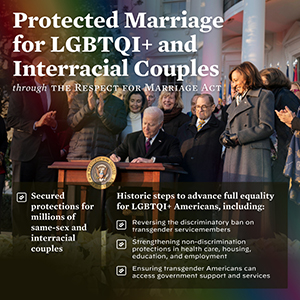Executive & Legislative Advocacy
 Legislative Advocacy - Respect for Marriage Act
Legislative Advocacy - Respect for Marriage Act
H.R. 8404
The Respect for Marriage Act was introduced in the House to shore up marriage rights after the Supreme Court's Dobbs v. Jackson decision, which overturned Roe v. Wade and called the stability of other landmark civil liberties cases into question.
Justice Clarence Thomas specifically called for the Court to reconsider Obergefell in his concurring Dobbs opinion because it rested in part on the same legal basis as Roe — substantive due process, which restricts government infringement upon fundamental individual rights even if they are unenumerated, such as birth control and interracial marriage.
Specifically, the act replaces provisions that define, for purposes of federal law, marriage as between a man and a woman and spouse as a person of the opposite sex with provisions that recognize any marriage between two individuals that is valid under state law.
The law repeals the Defense of Marriage Act, which prohibited the federal government from recognizing same-sex marriages and allowed states to refuse to recognize same-sex marriages performed elsewhere. The act provides statutory authority for same-sex and interracial marriages.
The specific impact of the Respect for Marriage Act on same-sex couples and their families in a post-Obergefell world would vary based on state law.
The act replaces provisions that do not require states to recognize same-sex marriages from other states with provisions that prohibit the denial of full faith and credit or any right or claim relating to out-of-state marriages on the basis of sex, race, ethnicity, or national origin.
- The Supreme Court held that state laws barring same-sex marriages were unconstitutional in Obergefell v. Hodges in 2015; the Court held that state laws barring interracial marriages were unconstitutional in Loving v. Virginia in 1967.
The act allows the Department of Justice to bring a civil action and establishes a private right of action for violations.
The law unexpectedly gained Republican support and passed the Senate on Nov. 29 after being amended to ensure that nonprofit religious groups aren't required to help perform same-sex marriages.
The act does not:
- Affect religious liberties or conscience protections that are available under the Constitution or federal law,
- require religious organizations to provide goods or services to formally recognize or celebrate a marriage,
- affect any benefits or rights that do not arise from a marriage, or
- recognize under federal law any marriage between more than two individuals
On November 30th, Mayor Turner wrote to the Houston Congressional Delegation urging members vote for the Senate passed measure, saying:
For many families in Houston, this legislation would protect families by repealing the Defense of Marriage Act and requiring states to recognize all marriages that were legal where they were performed. This would be especially important in states like Texas, where laws remain on the books banning same-sex marriage and sodomy, despite Supreme Court rulings legalizing both.
The Respect for Marriage Act would also protect interracial marriages by requiring states to recognize legal marriages regardless of “sex, race, ethnicity, or national origin.”
The bill became law when it was signed by President Joe Biden on December 13, 2022.
Respect for Marriage Act Links:
- View the Respect for Marriage Graphic in Full-Sized .jpg
- H.R. 8404
U.S. Congress Website - What the Respect for Marriage Act does and doesn't do
ABC News - 12.13.2022 - What does the Respect for Marriage Act do? The answer will vary by state.
NPR - 12.08.2022
Legislative Advocacy Links:
- HELP Act
- Broadbrand Preemption
- Respect for Marriage Act
- De-Escalation Training Act
- Safer Communities Act
Supporting Links: